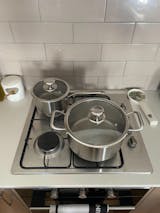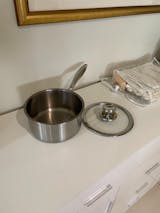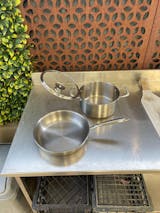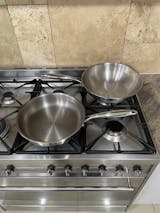
Ditching the Doubt: Why Titanium Cookware is the Healthiest Choice for Your Kitchen 🍳
Share
The cookware aisle can be overwhelming. There are so many materials, each promising to be the best. But when you’re prioritizing health and safety in your kitchen, you need to look beyond the marketing and understand the potential risks lurking in some of the most popular cookware materials. Many of the pans that are staples in kitchens across the globe have some serious drawbacks. Fortunately, there's a clear winner when it comes to both safety and performance: titanium cookware.
The Hidden Dangers of Other Cookware Materials 🚨
Let's break down why some of the most common cookware options might not be as good for you as you think.
Non-Stick (PTFE/Teflon)
Non-stick pans are prized for their convenience, but their coatings are a major source of concern. Many traditional non-stick surfaces use a chemical called polytetrafluoroethylene (PTFE), commonly known by the brand name Teflon. While considered stable at low to medium temperatures, when overheated, these coatings can release toxic fumes. This can lead to a flu-like condition known as "polymer fume fever." 😷 In some cases, the fumes can be lethal to birds. Additionally, a chemical once used to make PTFE, perfluorooctanoic acid (PFOA), has been linked to serious health problems like cancer, though most modern non-stick pans are PFOA-free. The newer replacements for PFOA are also being investigated for potential health risks. The bottom line? Scratched or damaged non-stick pans can flake, introducing tiny particles into your food, and their chemical stability is compromised at high heat.
Aluminum
Aluminum is a popular choice because it’s lightweight, affordable, and conducts heat very well. However, bare aluminum is a highly reactive metal. When cooking acidic or salty foods—think tomatoes, vinegar, or citrus—aluminum can leach into your food, giving it a metallic taste. While the amount of aluminum that leaches is typically small, some studies have raised concerns about the long-term effects of ingesting excess aluminum, with potential links to neurological issues. While anodized aluminum is a safer, non-reactive alternative, the anodized layer can wear down over time, exposing the reactive metal underneath.
Stainless Steel
Stainless steel is a popular and generally safe option, but it's not entirely without its own issues. It’s an alloy, typically containing iron, chromium, and nickel. While these metals are largely stable, they can leach into food, particularly when cooking for long periods or with acidic ingredients. This can be a problem for people with nickel or chromium sensitivities, as a small amount of leaching could trigger an allergic reaction. The quality of the stainless steel matters significantly; lower-quality stainless steel with a weaker alloy is more likely to leach these metals into your food.
Copper
Copper cookware is beautiful and offers excellent heat conductivity, but it poses a significant health risk if not properly cared for. Bare, unlined copper is highly reactive and can cause copper poisoning if it comes into contact with food, especially acidic foods. Symptoms of copper toxicity can include nausea, vomiting, and abdominal pain. For this reason, most copper pans are lined with a non-reactive metal like tin or stainless steel. However, these linings can scratch, wear down, or degrade over time, exposing the toxic copper underneath. Regular inspection and costly re-tinning are required to maintain safety.
The Titanium Advantage: A Healthier Kitchen Awaits ✨
So, with all these potential dangers, what's the solution? Titanium cookware. It stands out as the superior choice because it completely eliminates the risks associated with other materials while offering unmatched performance.
Here’s why titanium is the best option for your health and your kitchen:
- 100% Non-Toxic and Biocompatible: Titanium is an inert metal, meaning it is non-reactive and does not leach any metals or chemicals into your food, regardless of the temperature or ingredients. This is the same reason it's used for medical implants like surgical instruments and joint replacements—it is completely safe for the human body.
- Naturally Non-Stick (without the chemicals): Pure titanium metal develops a natural non-stick surface over time with proper seasoning. This means you can enjoy the benefits of a non-stick pan without worrying about PFOA, PTFE, or other harmful chemical coatings that can degrade and flake.
- Incredibly Durable and Corrosion-Resistant: Titanium is one of the strongest, most durable metals available. It's highly resistant to scratches, dents, and corrosion. This means your titanium pans will last for a lifetime of cooking, and you won't have to worry about a compromised surface exposing you to harmful substances.
- Lightweight and Strong: Unlike heavy cast iron, titanium cookware is surprisingly light yet exceptionally strong. This makes it easy to handle and a pleasure to use for any type of cooking.
- Superior Heat Retention and Distribution: While it may take a moment longer to heat up than aluminum, titanium cookware holds heat incredibly well and distributes it evenly, eliminating hot spots and ensuring your food cooks perfectly.
The Verdict: Invest in Your Health, Invest in Titanium
When you choose titanium cookware, you're not just buying a pot or a pan; you're making a commitment to a healthier, safer cooking experience. You can confidently cook a variety of meals—from simmering a tomato sauce to searing a steak—without a second thought about harmful chemicals or metal leaching. Titanium provides the ultimate peace of mind, durability, and performance that every home chef deserves. It’s an investment in your kitchen that will pay dividends for years to come.






